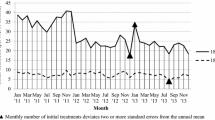Abstract
Prior research demonstrates substantial access problems associated with utilization management and formulary exclusions for antipsychotics in Medicaid, but the use and impact of coverage restrictions for these medications in Medicare Part D remains unknown. We assess the effect of coverage restrictions on antipsychotic utilization in Part D by exploiting a unique natural experiment in which low-income beneficiaries are randomly assigned to prescription drug plans with varying levels of formulary generosity. Despite considerable variation in use of coverage restrictions across Part D plans, we find no evidence that these restrictions significantly deter utilization or reduce access to antipsychotics for low-income beneficiaries.


Similar content being viewed by others
References
AMCP Electronic Prior Authorization Work Group (2015). Proceedings of the AMCP Partnership Forum: NCPDP electronic prior authorization standards—building a managed care implementation plan. American Journal of Managed Care, 21, 545–550.
American Medical Association. (2011). Standardization of prior authorization for medical services white paper. Retrieved March 20, 2016 from http://massneuro.org/Resources/Transfer%20from%20old%20sit/AMA%20White%20Paper%20on%20Standardizing%20Prior%20Authorization.pdf.
Balkrishnan, R., Joish, V. N., Bhosle, M. J., Rasu, R. S., & Nahata, M. C. (2007). Prior authorization of newer insomnia medication in managed care: Is it cost saving? Journal of Clinical Sleep Medicine, 3, 393–398.
Brown, J. D., Barrett, A., Caffery, E., Hourihan, K., & Ireys, H. T. (2013). Medication continuity among Medicaid beneficiaries with schizophrenia and bipolar disorder. Psychiatric Services, 13, 878–885.
Centers for Medicare & Medicaid Services. (2015). Medicare 2015 Part C & D Star Rating Technical Notes, Attachment L. Retrieved April 10, 2016 from https://www.cms.gov/Medicare/Prescription-Drug-Coverage/PrescriptionDrugCovGenIn/Downloads/2015StarRatingsTechnicalNotes.pdf.
Farley, J. F., Cline, R. R., Schommer, J. C., Hadsall, R. S., & Nyman, J. A. (2008). Retrospective assessment of Medicaid step-therapy prior authorization policy for atypical antipsychotic medications. Clinical Therapeutics, 30, 1524–1539.
Hargrave E., Hoadley J., Summer L., Merrell K. (2010) Medicare Part D formularies, 2006–2010: A chartbook. Retrieved April 10, 2016 from http://67.59.137.244/documents/Oct10_PartDFormulariesChartBook_CONTRACTOR_RS.pdf.
Huskamp, H. A., Stevenson, D. G., Donohue, J. M., Newhouse, J. P., & Keating, N. L. (2007). Coverage and prior authorization of psychotropic drugs under Medicare Part D. Psychiatric Services, 58, 308–310.
Lavetti, K., & Simon, K. (2014). Strategic formulary design in stand-alone and integrated Medicare Advantage prescription drug plans. Working Paper. Retrieved April 10, 2016 from http://www.kurtlavetti.com/MA_PDP_vc.pdf.
Law, M. R., Ross-Dengan, D., & Soumerai, S. B. (2008). Effect of prior authorization of second-generation antipsychotic agents on pharmacy utilization and reimbursements. Psychiatric Services, 59, 540–546.
Lu, C. Y., Soumerai, S. B., Ross-Dengan, D., Zhang, F., & Adams, A. S. (2010). Unintended impacts of a Medicaid prior authorization policy on access to medications for bipolar illness. Medical Care, 48, 4–9.
Morra, D., Nicholson, S., Levinson, S., Gans, D. N., Hammons, T., & Casalino, L. P. (2011). US physician practices versus Canadians: spending nearly four times as much money interacting with payers. Health Affairs, 30, 1443–1450.
Sacchetti, E., Grunze, H., Leucht, S., & Vita, A. (2015). Long-acting injection antipsychotic medications in the management of schizophrenia. Evidence-Based Psychiatric Care, 1, 27–36.
Seabury, S. A., Goldman, D. P., Kalsekar, I., Sheehan, J. J., Laubmeier, K., & Lackdawalla, D. N. (2014). Formulary restrictions on atypical antipsychotics: impact on costs for patients with schizophrenia and bipolar disorder in Medicaid. American Journal of Managed Care, 20, e52–e60.
Simon, K., Tennyson, S., & Hudson, J. (2009). Do state cost control policies reduce Medicaid prescription drug spending? Risk Management and Insurance Review, 12, 39–66.
Soumerai S.B., Zhang F., Ross-Dengan D., et al. (2008) Use of atypical antipsychotic drugs for schizophrenia in Maine Medicaid following a policy change. Health Affairs, 27, w185–w195.
Vogt, W. B., Joyce, G., Xia, J., Dirant, R., Wan, G., & Goldman, D. P. (2011). Medicaid cost-containment measures aimed at second-generation antipsychotics led to less use of all antipsychotics. Health Affairs, 30, 2346–2354.
Zhang, Y., Adams, A. S., Ross-Dengan, D., Zhang, F., & Soumerai, S. B. (2009). Effects of prior authorization on medication discontinuation among Medicaid beneficiaries with bipolar disorder. Psychiatric Services, 60, 520–527.
Funding
This is an unfunded study that was conducted as part of the corresponding author’s doctoral dissertation research.
Author information
Authors and Affiliations
Corresponding author
Ethics declarations
Conflict of interest
The corresponding author (Roberto) is employed on a part-time basis by the Pharmaceutical Research and Manufacturers of America (PhRMA), which had no role in the funding or conduct of this analysis. Authors Brandt, Onukwugha, Perfetto, Powers, and Stuart report no conflict of interest.
Ethical Approval
All procedures performed were in accordance with the ethical standards of the institutional and/or national research committee and with the 1964 Helsinki declaration and its later amendments or comparable ethical standards. For this type of study, formal consent is not required.
Disclosures
No portion of this work has been previously published or presented elsewhere. The manuscript has been read and approved by all authors. The findings and conclusions in this article are those of the authors and do not necessarily represent the official position of the Pharmaceutical Research and Manufacturers of America (PhRMA), or the U.S. government or the Centers for Medicare and Medicaid Services (CMS).
Appendix
Appendix
See Table 5.
Rights and permissions
About this article
Cite this article
Roberto, P.N., Brandt, N., Onukwugha, E. et al. The Impact of Coverage Restrictions on Antipsychotic Utilization Among Low-Income Medicare Part D Enrollees. Adm Policy Ment Health 44, 943–954 (2017). https://doi.org/10.1007/s10488-017-0813-2
Published:
Issue Date:
DOI: https://doi.org/10.1007/s10488-017-0813-2




